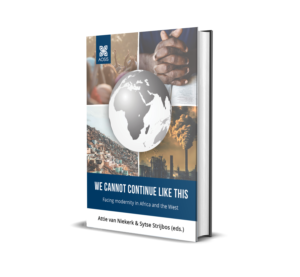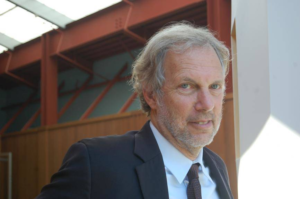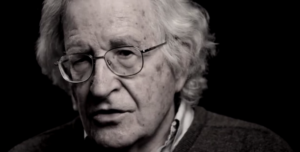Indigenous Organizers In Alaska Lead The Way Toward Livable Climate Future
In the United States, the public and politicians are moving in opposite directions on climate change. Grassroots environmental activism is spreading on the local state, regional and national levels, while Congress generally continues with a “business-as-usual” approach, rejecting the foremost way to avoid the worst consequences of global warming: the Green New Deal.
While the Green New Deal remains aspirational in the U.S., it has been adopted by the European Union, and scores of countries around the world have committed to pursuing its goals.
Among the many organizations in the U.S. fighting for environmental sustainability and a just transition toward clean, renewable energy is Native Movement, an organization dedicated to building people power for transformative change and imagining a world without fossil fuels.
“There is no future at all with continued oil and gas extraction,” says Ruth Łchav’aya K’isen Miller, Native Movement’s climate justice director, in this exclusive interview for Truthout. “We must eliminate fossil fuel extraction now through a just transition that guarantees justice for workers and for the lands.”
Miller is a Dena’ina Athabascan and Ashkenazi Jewish woman. She works toward Indigenous rights advocacy and is a member of the Alaska Just Transition Collective and the Alaska Climate Alliance.
C.J. Polychroniou: Ruth, what does a just transition, from a Native and Indigenous perspective, look like in Alaska?
Ruth Miller: A just transition is a journey of returning to economies, governance structures and social contracts that are not new, but built on Indigenous wisdoms and place-based knowledge to create a truly regenerative economy. A just transition will be built on a values framework of anti-racism and decolonization, deep reciprocity, and respect for all lands, waters and air.
Any just transition for Alaska must be rooted in Indigenous perspectives, because it is Alaska’s Native nations who have lived in harmony with these lands for over 30,000 years, and whose deep connections, encyclopedic knowledge and spiritual interconnectivity will heal the wounds of the past 100 years of colonization and extractive capitalism. For this reason, we refer to this shift in resource extraction, governance, labor practices and culture as “remembering forward,” first translated in 2020 in the Behnti Kengaga language as “Kohtr’elneyh,” and in 2022 in the Dena’ina language as “Nughelnik.”
In Alaska this takes many forms. It includes deep democracy, which actively seeks to incorporate minority voices as well as those in the majority and requires the diversification of elected leaders. It includes an end to all oil and gas extraction, as well as irresponsible mining and other development projects. It means a return to responsible land management practices, including timber and fisheries management, and it means returning stewardship of lands and waters back to their original and eternal caretakers. It includes supporting Alaska Native language and cultural revitalizations while supporting unimpeachable subsistence hunting and fishing rights. It means all workers will have their fair pay and rights protected through strong unions, while communities will be empowered to support themselves through mutual aid networks and non-predatory community loan funds for moving toward clean and efficient energy.
A just transition for Alaska means investing in regenerative industries like sustainable mariculture and ocean-healing crops such as kelp, while also supporting culturally informed eco-tourism that elevates local business with local returns. As we have previously written for Non-Profit Quarterly, “To achieve [a Just Transition], resources must be acquired through regenerative practices, labor must be organized through voluntary cooperation and decolonial mindsets, culture must be based on caring and sacred relationships, and governance must reflect deep democracy and relocalization.”
Why is the complete elimination of fossil fuel extraction needed to secure a just transition?
The simple truth is that the oil and gas industry is one of the largest contributors to climate change, spewing greenhouse gas emissions to the point at which we are now in the sixth great extinction — one which has been entirely caused by recent human activity. The Arctic, being bled dry for its non-renewable resources, is now experiencing a climate crisis at two to four times the rate as the rest of the globe.
In Alaska, thawing permafrost is not only destabilizing Arctic infrastructure, but the thawing of eons-old organic material leads to the accelerated release of methane, a gas more than 25 times as potent as carbon dioxide at trapping heat in the atmosphere. The same thawing is leading to coastal and riverbed erosion, causing more and more communities to be forced to relocate. Already less Arctic sea ice returns in the winter than past generations remember, putting coastal communities at increased risk of damage by winter storms.
With a global temperature rise of 2.5 degrees Celsius or higher (which we are projected to reach within the decade without drastic international action now), it is expected we will have an entirely ice-free Arctic Ocean at least once every eight years. Beyond their climate effects, extractive projects are already causing extreme and irreversible devastation to lands, waters and food systems.
The ecological harm caused by such projects leaves toxic waste, pollution and contamination, harming the health of Alaska Native peoples who live closest with the land. Near the sites of extractive projects, high rates of cancers, birth defects, respiratory illnesses, and more health impacts have been observed for decades. Indigenous women, girls and two-spirit relatives suffer increased rates of homicide, disappearance and domestic violence in and around the man camps that supply labor to extractive development projects.
There is no future at all with continued oil and gas extraction…. We must eliminate fossil fuel extraction now through a just transition that guarantees justice for workers and for the lands. Read more
Biden Is Breaking His Climate Promises. What Are The Consequences?
Although the war in Ukraine has put climate action on the back burner for many policy makers, the global climate crisis is spinning out of control. Various climate records were smashed in 2021, and greenhouse gas emissions are on course to hit record levels in 2023. In the face of such dramatic developments, political inaction on the climate front could portend an imminent environmental catastrophe.
In the interview that follows, world-renowned progressive economist Robert Pollin discusses the latest developments on the climate crisis, starting with Biden’s broken promises to provide leadership in the fight against the climate emergency, and the problems of soaring energy costs and inflation. He also refutes the arguments in favor of nuclear energy, as well as the claims that there is very little we can do to stop the burning of fossil fuels. Pollin is distinguished professor of economics and co-director of the Political Economy Research Institute (PERI) at the University of Massachusetts at Amherst, where he has authored many climate stabilization projects for different U.S. states. He is also the author of many books, including Climate Crisis and the Global Green New Deal: The Political Economy of Saving the Planet (co-authored with Noam Chomsky).
C.J. Polychroniou: Bob, why did Biden break his promise on no new leasing on federal lands? Aren’t there other ways to fight soaring energy costs besides a “drill, baby, drill” policy? And will record high gas prices actually be solved by drilling more?
Robert Pollin: The Biden administration announced last April 15 that it would lift the executive order it had established in January 2020 that imposed a temporary ban on auctioning off federal lands for oil and gas leasing. This is despite the fact that, as a presidential candidate, Biden pledged, “And by the way, no more drilling on federal lands, period. Period, period, period.” So much for even Biden’s most emphatic campaign promises.
One excuse that the administration has given for Biden’s flip-flop is that a federal judge in Louisiana had struck down the January 2020 executive order. However, Biden could have easily delayed the awarding of new drilling permits indefinitely by fighting the judge’s order in court. Biden chose not to do this. The administration’s excuse here is that, in the immediate, Biden has had to focus on pushing down energy prices and overall inflation. The administration claims that opening up federal lands for drilling will increase oil and gas supply and thereby counteract the sharp oil and gas price increases that have prevailed since over the past year.
Specifically, the average retail price of gasoline has risen nearly 150 percent over the past year, from an average of $1.77 per gallon over May 2021 to $4.23 from May 1–23 this year. This spike in gasoline prices, along with rise in heating oil prices, has, in turn, been the single biggest driver causing overall U.S. inflation to rise by 8.3 percent over the past year, the highest U.S. inflation rate in 40 years.
Without question, we face serious problems with surging oil and gas prices and overall U.S. inflation. But it is also obvious that expanding drilling on public lands will have precisely zero impact on oil prices over the next year or two, if at all. This is because any supplies that could be produced through new drilling on federal lands will not become available in the retail energy market for at least 1 to 2 years. In addition, the amount of new oil and gas supplies that could ever come onstream from these projects would be minuscule as a share of the overall global energy market.
The Biden administration certainly must know all this. Their policy reversal is therefore all about optics — they want to convey the impression that they are taking strong measures to fight high gas prices, even while, in fact, they are doing no such thing. This Biden strategy is especially damaging since, rather than straining now so ineptly to manipulate public opinion, they could instead get serious to enact effective measures that can both fight climate change and protect people’s living standards against the vagaries of the global oil market.
Getting serious has to begin with the recognition that if we are going to have any chance of meeting the goals of the Intergovernmental Panel on Climate Change (IPCC) for climate stabilization — i.e., a 50 percent reduction of carbon dioxide (CO2) emissions by 2030 and zero CO2 emissions by 2050 — then we have to maintain a hard commitment to phasing out fossil fuel consumption every year, with no backsliding permitted — i.e., “period, period, period.” This is because burning oil, coal and natural gas to produce energy is by far the largest source of CO2 emissions globally and therefore the biggest driver of climate change. At the same time, the world now depends on fossil fuels to meet 80 percent of global energy demand. We should therefore assume that short-term crises will regularly emerge in which, similar to the current situation, the imperatives of climate stabilization will appear less pressing than keeping energy supplies abundant and prices low. We need to be prepared to meet these inevitable short-term crises without ending up, each time, clinging to our current dependency on fossil fuels.
Within this context, any measure now to push fossil fuel prices back down would be moving us in the wrong direction, since lower fossil fuel prices will encourage greater fossil fuel consumption. Rather, on behalf of saving the planet, we actually need all fossil fuel prices to remain high, and indeed, if anything, to increase still further. This is because high prices for oil, natural gas and coal will discourage consumers from buying fossil fuels to meet their energy needs. High fossil fuel prices will also incentivize efforts to build a new energy infrastructure, whose two pillars will be high efficiency and renewable energy, in particular solar and wind power. A high-efficiency renewable energy-dominant infrastructure will, among other things, deliver cheaper energy than our current fossil fuel-dominant system. But that cannot happen in an instant. In the meantime, we cannot allow working class and middle-class people to experience cuts in their living standards right now through high fossil fuel prices while oil companies’ profits explode. How can we effectively address these equally valid, though competing, considerations? Read more
Trust me (we’ll get to know each other later) – Tagline: blockchain re-invents who and how we trust
I’ve been mulling a wry title for this piece. The passage of deliberation punctuated by flocks of green avians (yes, parrots and in Amsterdam!) dissecting the blue, blue firmament on their screeching way to somewhere possibly exotic, only to pivot and rush back the way they had come mere moments later.
The struggle is to find the depth of pith required to compliment the hint of wit that will sustain attention beyond a headline. ‘Trust me (again)’ comes close as does ‘Trust re-invented’. ‘Trust 2.0’ is potentially smirk worthy but only to those, perhaps, for whom Web 3.0 or Industry 4.0 elicit a familiar nod.
Trust me, this was the best I could do.
Most of us trust someone or something: a distant cousin on your mother’s side, a company, an institution, or even the government. Agreed, it was not strictly necessary to add the word ‘even’ when mentioning the government and yet…
Trust runs through us like Brighton through rock. It’s free and freely given. It’s easily and frequently betrayed only to be given again.
And so…
We trust that the barber is no Sweeney Todd; that government will safeguard state pensions; that the late-night Uber driver is, honestly, just an Uber driver; that the limited-edition Warhol is not, on inspection, a Wharwhole; that the heating engineer can distinguish a water pipe from a gas pipe; that the eviction technician barring entry to Koooolers Nightclub will not sell the enforced copy of your ID to X-Ron3023, a denizen of the dark-web and a close associate of NightKnightBungie100-2; that the recently promoted (former) assistant VP now has access to the executive bathroom on the top floor.
We need trust. The moment maker. The oil in the works. What is there without trust? And I implore you to keep in mind that trust starts with truth and ends with truth, fear leads to more fear, and trust leads to more trust, and we must surely all concur that to be trusted is a greater compliment than being loved. Trust Hemmingway to weigh in with ‘The best way to find out if you can trust somebody is to trust them.’
All good. Not a jot of critique from my side. Old school trust. Built over decades, augmented by endorsements of others. The trusted and tested and true assured reliance on character and values and judgement, our innate ability and strength to see the truth of someone or something leading us have confidence (unscientifically, some might say) that our best interests will be represented, or at the very least not compromised.
It’s been a battle – a losing battle – to maintain my willingness to trust those making increasingly frequent requests for, yes, my trust. You can trust us with your profile data, they cry; you can trust our claim that the coffee-famer received a living wage in the production of this premium product; that the energy powering my microwave is not only green but the greenest; and that this cod was sustainably caught in the North Sea using the latest ecologically friendly gear and the discard (read: disposing of dead fish that you’d rather not have caught) was negligible.
Sceptical? Should you find a moment in your local supermarket to peruse the little letters and labels printed on the packaging en route past Dairy and Fresh to where Linda waits patiently at the checkout, you’ll surely agree that the credibility of these claims is enhanced by cutting-edge keywords that include (but are not limited to) WiggleWoggle certified, artisan organic, free range (define range) and farm fresh(ness) – whatever that means.
Further doubts may be placated by a plethora of QR codes and high-quality logos and, without a shred of hesitation on my part, I’d like to state for the record that many of these logos go way beyond clipart.
Look, we’re a few paragraphs in and I’ve not mentioned blockchain which has not been easy. Don’t ask or expect me to defend the many (but not all) justifiable claims that cast blockchain in a poor light. Decades must pass before blockchain’s battered reputational half-life decays to the point of defying detection.
Blockchain. Disruptive? Disreputable? I need to move on as, otherwise, this post will assume book-length dimensions as I attempt to parry what many are thinking. My plea, humbly made, is that you will accept that blockchain is a ‘thing’ and that we’ll save other discussion for later.
[Author’s note: the remainder of this article contains numerous dangerous bends in train of thought, and a range of concepts and terms invented by nerds whose average age is twenty-three. Continue reading only under medical advisement].
How can blockchain replace old school trust? What could possibly supplant the handshake, the written agreement, the unshakeable faith in a bond handed down the generations?
The answer is that blockchain cannot replace any of these things.
Rather, blockchain facilitates alternative forms of trust. Trust between parties that have never met, who have not heard of one another, who do not like each other, who compete with each other and – I’m just putting it out there – do not trust each other. Blockchain facilitates trustless transactions where a distributed network of ‘verifiers of truth’ (nodes) guarantee both the execution of transactions between parties (liveness) as well as the integrity of transactions following agreement (consensus).
Furthermore, blockchain requires no mediating (meddling?) third-party as an enabler and, as a result, there is no centralised authority needed to deny or refuse or scrutinise or record any transaction or interaction between two parties. Humans are not involved in consensus forming and, as a result, there is no opinion-based influence and no ad-hoc bias. Given the same set of inputs, the blockchain will consistently resolve in the same manner each time of asking. Trust me on that.
In considering how blockchain helps reinvent trust, we need to first dispel the notion that blockchain and cryptocurrency are synonymous. The repute of the former tarnished by the ponziness of the latter. Take transactions for example. The first and best-known blockchain network was named ‘Bitcoin’, while the first and best-known cryptocurrency was named ‘bitcoin’ (the branding agency has a lot of explaining to do). And the first transaction involved a bitcoin token on the Bitcoin network. Read more
Noam Chomsky: The Supreme Court Is Wielding Illegitimate Authority In The US
Former president Jimmy Carter deemed the U.S. as having become “an oligarchy with unlimited political bribery” in the aftermath of the Supreme Court’s 2014 decision to strike down limits on campaign contributions, and the wielding of illegitimate authority within our political system has only grown more extreme in the eight years that have passed since then.
“Illegitimate authority” is often construed to be a trait of non-democratic societies and failed or collapsed states. In reality, however, illegitimate authority can be quite widespread in so-called democratic polities such as that of the United States.
The U.S. Supreme Court, for example, has the authority to issue judicial writs that go against the public interest and even violate human rights. Public policy is overwhelmingly affected by economic elites and powerful interest groups, with the general public having little or no independent influence as scholarly research has shown. The legitimacy of political authority in the U.S. is indeed very dubious when we consider the dynamics of decision-making and the rules at play.
In the interview that follows, Noam Chomsky — a public intellectual regarded by millions of people as a national and international treasure — gives us a real tour de force exposé of largely unknown facts in U.S. legal history while boldly revealing how many of our governing institutions and leaders wield illegitimate and undemocratic authority over much of the country’s contemporary political and economic landscape. Let’s keep in mind that we should assume that all authority is illegitimate, unless it can justify itself. Indeed, the burden of proof is on advocates of authority, not on those question it, as Chomsky often points out whenever he discusses the topic of authority.
In this interview, Chomsky shares his insights about activism and the urgency of undertaking a transition toward a sustainable future. Chomsky is institute professor and professor of linguistics emeritus at MIT and currently laureate professor at the University of Arizona, and has published some 150 books in linguistics, political and social thought, political economy, media studies, U.S. foreign policy and international affairs.
C.J. Polychroniou: Noam, over the past couple of decades, we’ve been witnessing a surge of illegitimate authority. And I am not thinking so much about the increasing influence of transnational corporations on democratic processes as about decisions made by a handful of appointed or elected individuals that affect the lives of millions of people. For example, a few people sitting at the Supreme Court were appointed for life by presidents that lost the popular vote, and they often enough issue decisions that go against the majority of voters’ preferences. Another example is members of the U.S. Congress who block bills aimed at the improvement of the economic well-being of citizens and the protection of the environment, choosing instead to introduce legislation catered to the interests of powerful lobby groups. Can you comment about this most despairing state of affairs in the U.S. political landscape?
Noam Chomsky: The Supreme Court has traditionally been a reactionary institution. There is some deviation, but it’s rare. The Warren Court’s major decisions greatly enhanced freedom and basic rights, but not in isolation: There were popular movements, primarily African American but joined by others to a degree, which made it possible for the Warren Court’s rulings to be implemented. Today’s reactionary Roberts Court is reverting to the norm with its dedicated efforts to reverse this deviation. And it can do so thanks in large measure to the conniving and deceit of the leading anti-democratic figure in the Republican organization — no longer an authentic political party: Mitch McConnell.
All of this is, or should be, well known. I’ll return to a few comments about it.
Less well known is how far back this goes. Some of the story is familiar, but not all. It’s familiar that the enormous power of the Supreme Court traces back to Justice John Marshall’s decision in Marbury v. Madison to make the judiciary the arbiter of the meaning of the law, powers going well beyond what is granted in the Constitution. His appointment by John Adams, and his own immediate appointments and decisions, were designed to undercut the newly elected Jefferson administration.
Shades of McConnell.
Marshall’s opinions had a major impact in shaping the constitutional order as it in fact is interpreted. His imprint on the court is unmatched.
All of that is again well known.
Much less well known are the assumptions that lie behind Marshall’s major decisions. In fact, these have only recently been revealed in legal scholarship by the important work of Paul Finkelman, who did the first systematic study of Marshall’s rulings on a central element of American history: slavery, which is likely to be expunged from history curricula if Republicans regain power and can implement their totalitarian initiatives to determine what cannot be taught in schools.
Finkelman explores “Chief Justice John Marshall’s personal and political commitment to slavery, as a lifelong buyer and seller of human beings, and his deep hostility to the presence of free blacks in America.” He then proceeds to show that in his judicial rulings, Marshall “always supported slaveowners when blacks claimed to be free. Similarly, he consistently failed to enforce the federal prohibitions on American participation in the African slave trade or, after 1808, the absolute prohibition on bringing new slaves into the United States.” As Finkelman points out, Marshall’s harsh and brutal rulings were “consistent with his lifelong personal and political support for slavery.”
Apart from the immediate impact on the lives of those treated as less than human in his day and throughout American history, Marshall was no ordinary justice. It is an understatement to say that he is “perhaps the Supreme Court’s most influential chief justice.” Read more
Alicia Garza: “The Shooter Wrote A Manifesto, And My Name Was Included In It”
The 18-year-old white supremacist who traveled to Buffalo to shoot Black shoppers at the local supermarket didn’t only target the 10 Black people whom he killed. His hate-filled manifesto made clear that he aimed to target all Black people in the U.S. — and also mass organizing for racial justice.
“Black communities and Black families must once again grieve the loss of loved ones — mothers, fathers, partners, siblings, friends — at the hands of white supremacy and racialized violence,” Radical organizer and activist Alicia Garza, cofounder of Black Lives Matter and Principal of Black Futures Lab, told Truthout in the wake of the attack. “I am heartbroken and my heart extends to every family who lost a loved one in this weekend’s senseless violence.”
Garza added: “The shooter wrote a manifesto, and my name was included in it. This is the second time in two years that this has occurred. The first time, I was targeted along with several others in a plot to cause violence and destruction.”
According to the New York Times, the manifesto published by the mass shooter, Payton S. Gendron, stated that he had decided to target east Buffalo “because it held the largest percentage of Black residents near his home in the state’s Southern Tier, a predominately white region that borders Pennsylvania.” The killer’s manifesto praised the white supremacist who killed nine Black churchgoers in Charleston, South Carolina, in 2015 and also praised the white supremacist shooter who killed 51 Muslims in Christchurch, New Zealand, in 2019.
The attack has spurred renewed calls for mass organizing across the country. Garza is also calling for swift action to curtail the proliferation of racial terror and broader participation in ongoing mass organizing efforts in the U.S. to push back against the emboldening of white supremacists nationwide.
Garza emphasizes that combatting the emboldened forces of white supremacy in the U.S. while simultaneously confronting other forms of inequality, poverty, climate crisis and environmental injustice will require building broad-based social movements with the power to significantly alter how capitalist institutions function and the strategic vision to initiate a transition toward a new socioeconomic order beyond capitalism. These have never been easy tasks, yet they are even more important in our own time as global neoliberalism has intensified economic and social contradictions and the climate crisis threatens to end organized human life.
In the interview that follows, Garza explains why racism continues to play such a critical role in our society, how to build independent Black political power, which is the mission of Black Futures Lab, and what is needed in the face of attacks like the white supremacist shooting in Buffalo.
C.J. Polychroniou: What words would you like to offer up in this moment, as people absorb the horrifying news of the anti-Black mass shooting in Buffalo?
Alicia Garza: White nationalist violence is escalating — and the leadership of this country refuses to do anything significant about it. For the last six years, the former president, his supporters and like-minded politicians have taken up a bullhorn to work up white nationalists, white supremacists and vigilantes. They have gained political capital by stoking the fears of people who fear demographic change, and given political and moral cover to those who respond to these changes — and to their fear of and anxiety about this country’s undeniable future — with violence. This is not new. We know the backlash that occurs when Black communities flex our power. The response has always been racialized terror and racialized violence, and it is being used on purpose.
While the president tours the country encouraging states to spend COVID dollars on expanding police forces, white supremacists are wreaking havoc in our government and in our lives. White supremacists are emboldened when they know that there are no significant consequences for their actions, and when they realize they have sympathizers and allies in our government. Which political party will take real action to save lives and to save this country? We don’t need any more empty words, statements, or symbolic gestures. We need action, and we deserve real change.
Companies like Wikipedia and Facebook are also complacent, as they shelter and provide information that allows white nationalists to carry out racial terror. The existence of a profile I did not initiate has been leveraged to obtain sensitive information about myself and my family for the second time. Despite our safety being compromised, Wikipedia continues to refuse to do anything about it, ostensibly in the name of free speech and protecting “user generated content.” But what happens when those users are white supremacists? I am not the only one Wikipedia will not protect — journalists and other activists are experiencing these same challenges on their site. They are just one of a few sites that excuse and condone the invasion of our privacy and leave us vulnerable to attacks from people who want to harm us because of the work we do.
Without swift and decisive action, we will continue to see racial terror proliferate, and more innocent lives will be stolen.
You have been an organizer and a civil rights activist for over two decades. You are the co-creator of Black Lives Matter (BLM) and principal at Black Futures Lab (BFL). Could you share your thoughts on why racism remains a foundational feature of U.S. society?
Racism remains a foundational feature of U.S. society because it is key in distributing power. Power is the ability to make the rules and change the rules, and racism helps to determine who gets to make the rules. Racism provides the justifications for why some people have and some people don’t, why some people live longer than others, have roofs over their heads and jobs, why some people can be doing really well while others are really struggling. Racism keeps us from fighting back, together, against these rigged rules, because racism helps to obscure that the rules are rigged in the first place.
Tell us about Black Futures Lab. How did it come about and what are its primary aims and ultimate goals?
The Black Futures Lab works to make Black communities powerful in politics, so that we can be powerful in the rest of our lives. We work to equip Black communities with the tools we need to undo the rules that are rigged against us, and to replace rigged rules with new rules that move all of us forward, together.
I started the Black Futures Lab, and another political organization, the Black to the Future Action Fund, to build independent Black political power — that means to put Black communities in a position to make the rules and change the rules, and to be a part of deciding who gets what, when, and why. At the Black Futures Lab, we have a few strategies that we employ to build Black political power. We collect recent and relevant data about who our communities are and what we want from our government — the Black Census Project is a part of that work.
With the Black Census Project, we are working to collect 200,000 responses from Black communities across the nation, to learn more about what we’re experiencing every day, and what we want to see done about it. We do policy and legislative advocacy work, taking the information from our research and using it to inform policy that would improve the lives of Black communities. We also train our communities how to write, win and implement new rules that would improve our lives in cities and states. We design good public policy and work to get it passed in order to motivate and activate Black communities to vote. And we invest in our communities with the resources we need to be powerful. We provide resources for organizing that folk may not have access to otherwise.
Through our first Black Census Project, we provided Black organizations with resources to hire organizers, and the technology they needed to reach as many people as possible; we’re doing the same with this year’s Black Census Project. This year, we’ll be moving about $2 million to Black organizing work, to Black-led organizations across the country.
The problem of low wages is considered to be the most pressing one among Black respondents who took part in a recent Black Census initiated by BFL. What do you consider to be the best strategies for raising wages and improving labor standards for people of color?
In order to address the problem of low wages that are not enough to support a family, Black Census respondents favored raising the minimum wage to $15/hour and increasing government participation in providing housing and health care. In the most recent Temperature Check polls run by the Black to the Future Action Fund, respondents want to see an extension of the COVID-19 stimulus bill in the form of monthly $2,000 checks until the pandemic is over. Respondents indicate that they would use that stimulus check for matters of survival — rent/mortgage, utilities, healthcare. We also see a desire to strengthen unions and regulate workplaces and corporations in order to address labor standards and wages.
Black communities and people in poverty have disproportionately high exposure to health and environmental risks. Given that environmental racism is very real in the U.S., what do you envision to be the role of Black Futures Lab in the struggle against environmental racism and in the broader task of building a global climate movement?
Black communities are disproportionately impacted by environmental racism. We found in our Temperature Check Polls that Black people understood the environment to be about more than weather — it was also about having access to the things we need to live well. A third of our respondents said that lack of access to clean drinking water was a major concern for them, and 31 percent said that a lack of access to healthy food was one of their primary concerns related to environmental racism. Our role is to show the impact on Black communities, and ensure that the resolution to those impacts present themselves in public policy that we win and implement in cities and states across the country.
Forging a common identity among people from diverse communities, with a shared worldview and a shared strategy in the pursuit of justice and radical social change, defined the mission of social movements worldwide during the 1960s and 1970s. I may be wrong, but I don’t see this being the case with many of today’s social movements, which seem to concentrate overwhelmingly on single issues and are indeed deprived of an overarching agenda for transforming our world. What are your own thoughts on this matter? Is it possible to build a broad and inclusive social movement in the political, social, economic and cultural landscape of the 21st century that challenges the existing socioeconomic order while envisioning a future that works for all?
I can completely understand why it feels like our movements are siloed — and I do think that there are and have been many efforts at creating and advancing an overarching agenda to change the world. Because so much of our work happens in nonprofit vehicles that are forced to rely on philanthropy and philanthropic dollars, our work begins to reflect the challenges we face in funding it. Philanthropy is largely divided into single issues, and if our movement is dependent on philanthropy to survive, it means we will likely be organized in this way as well. We also have to keep rebuilding our infrastructure to account for the attacks we experience from the state and, frankly, from inside our own ranks. History is not linear, and there are a lot of different factors that contribute to our state of being. But, from the Movement for Black Lives to Grassroots Global Justice Alliance, there are seeds being planted that aim to coalesce our movements into something coherent and cohesive and hopefully, one day, unstoppable. And that is something that gives me a lot of hope.
Copyright © Truthout. May not be reprinted without permission.
Attie S. van Niekerk & Sytse Strijbos (Eds.) – We cannot continue like this: Facing modernity in Africa and Europe
 Synopsis
Synopsis
The book is based on the view that the present trajectory of modern development cannot continue as it is now because it is ecologically unsustainable, it continues to enlarge the gap between rich and poor, and the decolonialisation movement has drawn our attention again to the specific role of religion, culture and value in human affairs and the need for a robust element of indigenisation and contextualisation. This book is strongly focused on the context of Africa, with two chapters that are written by authors from the Netherlands, for the purpose of presenting a North-South dialogue. The book contains reflection on approaches followed in building sustainable human communities in general and reflection on specific efforts to solve sustainability issues. It seeks to integrate academic reflection and insights gained from practical involvement with sustainability issues in local communities and low-income households, with contributions from Theology and Natural and Social Sciences.
Download the book (open access):
https://books.aosis.co.za/index.php/ob/catalog/book/283
Preface
This book is the first result of a quite unique and emerging researc collaboration between three organisations, NOVA, the International Institute for Development and Ethics (IIDE) and the Centre for Faith and Community (CFC) that is housed at the Faculty of Theology, University of Pretoria. The central aim is to chart an innovative course in the debate on ‘sustainability and development’. NOVA and IIDE are independent entities that both want to operate as an intermediate between the university and broader society. Read more







